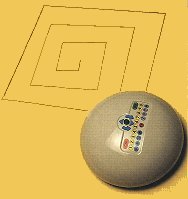
|
Feedback Form

ROAMER'S UNIT SETTING FEATURE

"During the design of Roamer it seemed every teacher we asked wanted the Roamer to use different sets of units", recalls Valiant's education adviser Maurice Meredeth. "In the end we decided to provide a unit setting feature". Maurice looks at how this facility has literally added unforseen dimensions to Roamer's versatility.
| TO CHANGE UNITS OF DISTANCE Press  or
or  followed by
followed by  then press a number between l and 99. Press
then press a number between l and 99. Press  again. The number determines how many centimetres will be in each
unit of distance.
again. The number determines how many centimetres will be in each
unit of distance. Sets the unit of distance
to l0cm. Sets the unit of distance
to l0cm.
| ||||||||
| TO CHANGE UNITS OF TURN Press  or
or  followed by
followed by  then press a number between 1 and 999. Press
then press a number between 1 and 999. Press  again. The number determines how many degrees will be in each unit
of turn.
again. The number determines how many degrees will be in each unit
of turn. Sets the unit of turn to
90 degrees. Sets the unit of turn to
90 degrees.
| ||||||||
The change instruction has to be executed before it can be effective.
Starting with the default settings:
|
When switched on the Roamer will turn in degrees and move forward and backward in units of Roamer body lengths (30cm). These are called the default settings. Once the units are set, they remain unchanged until you redefine them or switch off the Roamer. Clearing Memory does not change the unit settings.
Establishing a working Environment.
A body length provides children with a 'yard stick' for estimating distance.
Its a good size for work on the floor but different units are needed for
work on a table or a piece ot paper. Some teachers set the Roamer to turn
in quarter turns to avoid young pupils having to cope with large numbers.
Other popular settings options are those of a clock face (30 degrees)
and the main compass points (45 degrees).
Science Problem
A group of Ron Vardley's pupils at Oakwood Middle School were set a challenge:
"Can Roamer work a seesaw, and if so how fast?" Repeat, forward 1 and
back 1 soon had Roamer seesawing happily as it moved 30 cm to and fro
over the fulcrum. They then learnt from the 'class grape-vine' about the
changing the units. By experimenting with units of 15, l0 and 5cm the
seesaw went faster and faster but with 4cm the seesaw stopped working.
Characterisation
The unit setting facility can be used to program Roamer characters with
different types of behaviour. Three girls at King Richard's Comprehensive
School in Paulsgrove designed a Roamer ladybird. When their "ladybird"
was "crawling", they told me, little furtive movements were required:
30cm units were too large. Setting the movement distance to lcm solved
their problem. The girls were delighted and went on, using a touch sensor,
to make their ladybird turn and scuttle away whenever it bumped into an
obstacle.
Scaling
"Roamer's doing the obstacle course ever so well now. Can it do a picture
for our books?" I was confronted with this situation in Shirley First
School, Southampton. We needed to change the units without clearing the
program from the memory. By adding  to the program and pressing GO, Roamer ran through the program at the
original scale and then reset the units of distance to 2cm. Fitting the
Roamer with a pen enabled it to draw the obstacle course to the new scale.
to the program and pressing GO, Roamer ran through the program at the
original scale and then reset the units of distance to 2cm. Fitting the
Roamer with a pen enabled it to draw the obstacle course to the new scale.
Mathematical Transformations
Investigation of transformations involves the transfromations and the
things being transformed. A Roamer program for an enlargement might be:

Here Pl is a scale setting procedure. The rest of the program makes the
Roamer move in a square.
Defining P1 as:  would set
the distance unit as l0cm. Executing the GO Program would send the Roamer
around a small square.
would set
the distance unit as l0cm. Executing the GO Program would send the Roamer
around a small square.
 would set the unit distance
to l5cm and pressing GO would send the Roamer around similar but larger
version of the same shape - a l5cm square. Thus Roamer comes close to
having a 'variable' facility allowing assignments like:
would set the unit distance
to l5cm and pressing GO would send the Roamer around similar but larger
version of the same shape - a l5cm square. Thus Roamer comes close to
having a 'variable' facility allowing assignments like:
With a GO Program: 
Investigate the effects of  as x increases, or decreases, from 30.
as x increases, or decreases, from 30.
| SPIRAL Procedure definition  GO Program  ...etc. | 
|
| Back |
|---|

